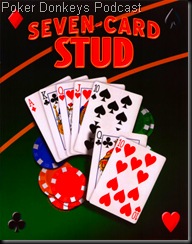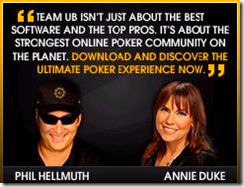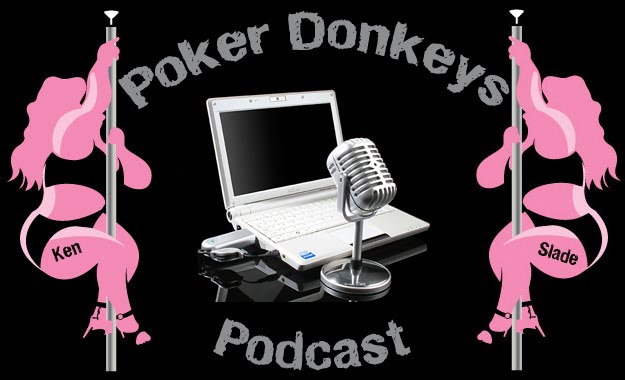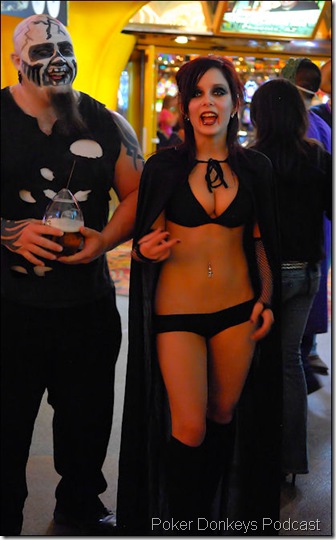My friend Izzy the one I talked about on the podcast. Nice bunny…!
Friday, October 30, 2009
New Poker Donkeys Podcast
EPISODE53 - Announcements and More Announcements
The greatest version of Poker Face ever.....
[CONTENT WARNING] Poker Donkeys Podcast features harsh language and even harsher notions of propriety. Listener discretion is advised.
Visit the Poker Donkeys Blog @ http://pokerdonkeysblog.blogspot.com
Visit the Unofficial Poker Donkeys Blog @ http://pokerjackass.blogspot.com/
Please send us your comments to: PokerDonkeys@gmail.com
Leave us a voice message @ 206-337-0379
Visit Our Friends
Gareth Witty http://www.garethwitty.co.uk
Stone Cold Bluff http://www.stonecoldbluff.co.uk/
Thursday, October 29, 2009
The Poker Star - Episode 5 - Recall
This week the contestant's must recall a series of events they witnessed including a car accident.
Running Bad
In 1964, Supreme Court Justice Potter Stewart tried to define what may or may not be considered obscene under US law. In the end, he determined that no definition existed, but that when it comes to obscenity, "I know it when I see it."
The same holds true when you're talking about running badly at the poker table. You may not be able to identify what's going wrong, but you know its happening. As far as I'm concerned, there's no single definition or criteria for "running bad" because it means something different to everyone. For some players, it's posting 10 or 12 losing sessions in a row. For others, it's losing a dozen coin-flips during a single session. "Running badly" depends on the individual and on the metrics they're using to judge their performance.
Whatever the definition is, the fact remains that everyone runs bad at one time or another. What separates successful players from those who go bust is how they handle themselves and their bankrolls when their cards go dead. For me, running bad doesn't mean having a few losing nights or taking a few bad beats over the course of a session. That's variance and it's an inevitable part of the game. In my mind, running bad is something bigger that happens over the long term.
If you're not sure whether you're really running bad or not, start by stepping back and analyzing your results over a statistically significant timeframe. If you see a consistent pattern of losing sessions over a matter of weeks or months, then it's likely that you're having some real problems with your game. The key to getting back on track is figure out what's actually going wrong.
For many players, running badly is a vicious circle; they suffer a few losing sessions and begin to tilt, which leads them to alter their playing styles in order to change things up. Soon, they do actually start playing badly, which leads to more losing sessions, and a continuation of their downward spiral. They lose because they're running badly and they're running badly because they're losing.
If you look at your game and believe that you're actually playing well but are just getting unlucky, then maybe you are. Aces get cracked by lower pairs. Sets get beaten by flushes, and hands get drowned on the river more often than you might think. My advice in these situations is to walk away from the game for a while. Take a break, regroup, and come back when you're mentally refreshed and are ready to start playing again. Don't, however, begin changing your game to compensate for bad luck. Focus on the fundamentals, look for good starting hands, and try to play the most solid poker you can. In time, your luck will change.
Whatever you do, however, don't try to step up in levels in order to try and recoup your losses. I've seen many players go bust at times like these because they're too focused on trying to rebuild their bankrolls by gambling rather than by playing smart poker and moving down to play at a lower level. Think about it; if you've been losing, chances are that you're playing on a smaller bankroll than normal, which means that you'll be risking a higher percentage of your remaining funds by playing at higher stakes. With a smaller cushion behind you and more of your bankroll at risk, it doesn't take long for things to go from bad to worse and for you to lose everything you had left.
On the other hand, by moving down a level or two, you'll be risking less in the short term while you try to rebuild your bankroll. Sure, the pots you win may not be as big as those you win at higher levels, but weighed against the odds of going broke, it's a trade-off I'm willing to make. What's more, by moving down, I may only have to play at a lower level for a month or two to recover my losses whereas if I go broke after moving up, it could take me a year or more until I've recovered. That's a pretty persuasive argument if you really value your time.
While I can't tell you whether you're really running badly or not, I can tell you that your mental state does impact your game. If you're feeling good, chances are you'll play well and, if you're not, chances are you won't. Rough patches are part of the game and learning how to handle short-term adversity without losing your confidence or your bankroll will make you a better player in the long run.
Your A Bot No Your Bot I Sue You Full Tilt
 A lawsuit has been filed against Full Tilt Poker, claiming that they use bots to keep games running longer and to employ more luck than skill. And that the bots were created by Chris Ferguson and Andy Bloch.
A lawsuit has been filed against Full Tilt Poker, claiming that they use bots to keep games running longer and to employ more luck than skill. And that the bots were created by Chris Ferguson and Andy Bloch.
The suit was filed in California by poker player Lary Kennedy, whose account at Full Tilt was closed a couple years ago because they claimed Kennedy used a bot herself, which is against the terms and conditions for the online poker site.
Kennedy's account was locked along with over $80,000 confiscated.
Kennedy, who goes by the name sillysal in poker forums, had the 2+2 community up in arms over her case, until they found out that she also multi-accounted -- playing under a different name on the same site simultaneously. That's also a Full Tilt no-no. She used the accounts "pokergirl_z" and "greggo777."
The story even made its rounds to TMZ.com, stating in their normal exaggerated way that "poker legends [are] sued for robot fraud."
Kennedy's website shows videos of her playing to prove she isn't a bot, photos of her with poker pros (including those affiliated with Full Tilt), threads from poker forums about the situation, and the complaint.
We're skeptical about how far this lawsuit will go, what with a sample of its 13 pages stating "a skilled player would start on-line jihads against the successful player."
But if it does go to trial, it will be interesting to find out some of the inner workings of Full Tilt.
Watch And Learn Online Video Poker Tips For FREE
 Get ready to sharpen your skills at the felt! Bodog now offers free online poker tips on video that are easy to learn and available at the click of your mouse. Now you can improve your game by watching video poker tips made by Team Bodog Professionals.
Get ready to sharpen your skills at the felt! Bodog now offers free online poker tips on video that are easy to learn and available at the click of your mouse. Now you can improve your game by watching video poker tips made by Team Bodog Professionals.
These video poker tips are for beginner poker players who want to elevate their game to an intermediate level. The strategies are designed to give new players a fighting chance against skilled players who use these strategies often.
Evelyn Ng and Team Bodog narrate short video clips explaining basic poker strategy tips. The videos are five minutes long or less, and each one covers a common topic that every player should learn about.
There are videos on cash games vs. tournaments and poker hand rankings as well as the rules of Texas Holdem and table position. Future videos from Justin Bonomo and David Williams are also a work in progress.
Most video poker tools are in the form of a DVD and come with a hefty price tag. Why pay hard-earned money for this information when you can get it online for free from experienced poker professionals?
Learn how to play poker the smart way, for free and online at Bodog Poker.
New Poker Game I Do Not Know About This
 Online poker room Ladbrokes Poker recently released a new type of online poker game. The game is called Survivor Poker, and it offers a new kind of poker strategy to challenge online poker players. The Survivor Poker tournament plays much like a normal freeze out multi table holdem tournament, but there are two ways to lose. Running out of chips is the normal way, but also if a player ends the round in the bottom 10 percent, he or she is also done. So far the online poker room has been running two new poker games each day
Online poker room Ladbrokes Poker recently released a new type of online poker game. The game is called Survivor Poker, and it offers a new kind of poker strategy to challenge online poker players. The Survivor Poker tournament plays much like a normal freeze out multi table holdem tournament, but there are two ways to lose. Running out of chips is the normal way, but also if a player ends the round in the bottom 10 percent, he or she is also done. So far the online poker room has been running two new poker games each day
Robbed And Pepper Sprayed
In the city of Cleveland a home poker game was hit by robbers. The masked men walked away with $11,000 from the poker game. The men were also armed with assault rifles, entering the apartment where the home poker game was taking place and robbing the players. The poker players were told to take off their pants and pass over the wallets. The wallets and all the poker money on the table were taken and the players were sprayed with pepper spray as the robbers took off. The poker game, which had been organized and advertised online, is considered legal as long as the house doesn’t take a cut.
Friday, October 23, 2009
Introduction to Seven Card Stud
 I know you 20-somethings might not believe this, but even though Texas Hold’em has been around for a long time, it has only recently become the insanely popular poker game that it is today. For ages, Seven Card Stud was the game of choice. Perhaps because of its simplicity, perhaps because it is the game that determines the champion at the World Series of Poker (WSOP), Hold’em has left Stud in the dust. Seven Card Stud is a great game, though, and deserves a second look by those who have ignored it, believing it is a game for old men. In this article, I would like to provide you with a quick, basic introduction to Seven Card Stud.
I know you 20-somethings might not believe this, but even though Texas Hold’em has been around for a long time, it has only recently become the insanely popular poker game that it is today. For ages, Seven Card Stud was the game of choice. Perhaps because of its simplicity, perhaps because it is the game that determines the champion at the World Series of Poker (WSOP), Hold’em has left Stud in the dust. Seven Card Stud is a great game, though, and deserves a second look by those who have ignored it, believing it is a game for old men. In this article, I would like to provide you with a quick, basic introduction to Seven Card Stud.
In Seven Card Stud, each player (a maximum of eight at a table) must put up an ante before they are dealt two down cards and one up card, also called the “door card.” Play begins with the player with the lowest door card, who is required to pay the “bring-in”, which is another ante of sorts. Play proceeds to the left, which each player deciding whether they want to call (also called “completing” the bet), raise, or fold.
There is then another card dealt to each player, face up, followed by another betting round. The player who starts the action is now the one who has the highest ranking up cards. Three more rounds of cards and bets follow, with the seventh and final card being the only other one aside from the initial two hole cards to be dealt face down. If there is more than one person remaining in the hand after the final betting round, the player with the best five-card hand, pieced together from the seven total cards, wins.
Each betting round is typically referred to as a “street”, numbered by how many cards each player has. For example, the first betting round, the one where all the players have two down cards and one up card, is third street.
In some ways, the game is similar to Texas Hold’em. Each player gets hole cards, there are cards dealt face up, there are multiple betting rounds, and each player must use five out of the seven cards to make a hand. However, that is essentially where the similarities end. Let’s look at some of the key differences.
Extra Betting Round
In Hold’em, there are four betting rounds: pre-flop, flop, turn, and river. In Stud, there are five: third through seventh streets. That extra betting round gets tricky because not only is it another opportunity to put yet more money in the pot, but also seventh street is the third face down card, resulting in more hidden cards in Stud than in Hold’em.
No Community Cards
Yes, there are face up cards in Seven Card Stud, but they are not shared by the players (except in the rare instances when the deck runs short on cards) and are therefore not community cards. Each player’s hand is unique. It is extremely rare for two players to split a pot in Stud. In Seven Card Stud High-Low, pots are frequently split by definition, but in Stud High, it almost never happens.
More Information
In Hold’em, you only know your own cards and three to five community cards to determine outs and probabilities. In Seven Card Stud, you not only know your cards, but also everybody else’s up cards. Think about it: If four opponents are still in the hand when fifth street is dealt, that’s 12 cards in addition to your five that you know are in play. In that sense, it’s easier to make a more accurate calculation of your outs in Stud than in Hold’em.
However, once seventh street rolls around, you have less information about your opponent’s specific holdings than you do in Hold’em since three of their cards are face down instead of just two. Obviously, if you were observant, you will remember the other players’ folded up cards and will thus have an idea of what your opponent doesn’t have in the hole.
Random Position
Because the face up cards determine who acts first, there is no way to know what positional advantage you will have before each hand. During the hand, things will become a little more predictable, but the first player to act can still change on every street. The player to your left will always be on your left and the player to your right will always be on your right, but you won’t know who acts when until each round is dealt.
No Avoiding It
In Seven Card Stud, you cannot avoid putting money into the pot because you must contribute an ante every hand. Everyone has something at stake every time. This makes the game a fantastic one for earning bonuses at online poker rooms, which require you to contribute money to the pot in order to get credit for a raked hand.
These were just a few tidbits to teach you a little something about Seven Card Stud. If you are new to the game, try it out at some low-stakes tables. I suspect you may like it.
Not Poker But I Watch Poker On Hulu
Oh Internet, say it ain’t so!
Hulu - my utopia of free TV online - may soon become another run-of-the-buck paid subscription site (see header image)! (Sigh) It was only a matter of time, really…
Broadcasting & Cable brings us this chilling news, which supposedly originated from the mouth of News Corp. Deputy Chairman Chase Carey, who said during the Onscreen Media Summit that:
“It’s time to start getting paid for broadcast content online…I think a free model is a very difficult way to capture the value of our content. I think what we need to do is deliver that content to consumers in a way where they will appreciate the value. Hulu concurs with that, it needs to evolve to have a meaningful subscription model as part of its business.”
Aw heck, we all knew this day was coming when we’d hear those words spoken about our beloved Hulu - doesn’t it always happen that way with our favorite sites?
However… In my vast Internet experience our favorite sites stop being “our favorite sites” pretty soon after they start asking for membership fees. I know that more than a few of you out there have woken up one day to find your favorite online pop-in spot suddenly requiring you provide them a credit card number, sending you back to the search engine nexus typing in the words “free, streaming…”
…Aaaand I suspect that tradition won’t be changing for the small pool of TV shows and movies that Hulu currently offers. Despite all those clever commercials with celebrities posing as aliens using Hulu to mush our brains, there’s still enough solid cerebral material left in this guy’s skull to determine that Hulu would need to expand its range of content much, much, wider for me to consider buying into the service. I’m talking:
- More popular cable series (even some premium channel shows for “platinum” members who pay extra).
- Every network primetime show of the current season.
- More GOOD movies (Better picks of old films; same-day and direct-to-video releases (at discounted cost); premium channel releases for platinum members).
- Same-day airings of primetime TV shows (with ads, if necessary).
- Bigger TV show archives (for when I go on an Arrested Development or It’s Always Sunny In Philadelphia binge).
- Exclusive “first looks” for movie trailers and making of featurettes.
- Music videos and Popular news clips added to the lineup.
- Embed and sharing capabilities on all shows/movies (at least clips).
- Everything in HD.
Now THAT - combined with Hulu’s great interface - would be a service I would pay for.
While I agree with Carey in the sense that it’s time for companies to have a fair shot at pursuing profits in the online market, I do think said companies are still floating archaic ideas about how to convert their “digital dimes” into digital-dollars.
The Internet has always been based on one fundamental principle: Accomplish a lot with little effort. So, if I can have access to a bunch of movies and shows I watch; get sneak peeks on the hottest music videos or movie trailers; keep up with reports on the latest news clips everyone is talking about; spend my rainy weekends marathoning through old favorites; see everything in crisp HD and share it all with my friends… Why not fork out a reasonable fee to accomplish all that?
Try selling me Hulu as it stands now, and I’m going to tell you the names of all the TV network sites where you can watch the same shows for free (hint: just throw a “.com” behind the name of your favorite network) - or maybe the names of sites that will stream old movie favorites, legally, for free. Basically, I’m going to tell you that I really don’t need Hulu all that much after all…
What about you - is Hulu something you’d pay to keep? Or does the notion of shelling out for it make you say “Thanks but no thanks!”
Thursday, October 22, 2009
The Poker Star Episode 4 - Composure
Competing in teams this week contestants must maintain their composure as the person who looses their cool will earn a seat at the elimination.
The Poker Star Episode 3 - Bluffing
The contestants think they know all about bluffing, but can they bluff their way through a job interview with human lie detector Steven Van Aperen?
The Poker Star - Episode 2 - Focus
The contestants arrive at the Melbourne Aquarium for their second challenge that requires them to “maintain their focus”.
Wednesday, October 21, 2009
I Did Not See This On EBay…
Dinosaurs in Las Vegas?
Yes, but only for sale.
Yesterday, the Venetian attempted to auction off 170 bones of a 66 million-year-old Tyrannosaurus rex skeleton called Samson.
Samson, discovered in the 1980s in South Dakota, is one of just three near-complete T. rex sets of bones in the world.
The reserve by Bonhams & Butterfields wasn't disclosed, but when bidding began at $2.5 million and ended at $3.7 million, it wasn't enough. In 1997, a T. rex sold for $8.3 million, and there was hope for Samson going to at least $6 million.
About 50 other fossils were also on the bidding block, with better success at selling (to the tune of $1.7 million).
As for Samson, he will continue to be shown at The Venetian until sold.
Wynn bought Brooks a jet plane.
When Garth Brooks comes out of retirement beginning Dec. 11 at Wynn Encore, will he and wife Trisha Yearwood move to Las Vegas?
Not likely, since he went into retirement in 2000 to take care of his three young daughters (who at the time were 4, 6, and 8).
So how does Steve Wynn get him to Vegas?
Wynn bought Brooks a jet plane.
The brand new 11-seater Challenger jet will transport Brooks from Oklahoma to Vegas Friday afternoon, where he'll perform that night, two shows on Saturday, one on Sunday, then return back in time to drive his daughters to and from school every day.
He will commit to shows a quarter at a time, to see how he and his family are handling the schedule. Ultimately the long-term plan is to play at Encore for the next 5 years.
The amount that Wynn is paying Brooks is being kept secret, but it's similar to adding an item to your Amazon shopping bag -- only instead of being too low to advertise, it's too high for the Wynn stockholders to be comfortable with.
Brooks will perform in the 1,500-seat Encore Theater for $125 per ticket.
Tuesday, October 20, 2009
Bluffing in Pot-Limit Omaha
Bluffing can be one of the most profitable plays in poker. However, its success is often blunted by the fact that it's also one of the most misunderstood and over-used plays in the game.
In Omaha, players may find even more reasons to bluff - and to get themselves into trouble - than they do in Hold 'em because four starting cards can lead to huge draws and present almost irresistible opportunities to try and steal pots from opponents. The key to bluffing successfully in this game comes from knowing when to make the play and who to make it against.
One of the best bluffing opportunities in Omaha comes on paired boards, but to pull this off, you have to know what kinds of paired boards to look for. Let's say you're involved in a hand with two other players. You're in late position and have called a pre-flop raise only to completely miss on a flop of K-K-8 rainbow. The flop is checked around to you, and you consider bluffing to see if you can steal the pot. My advice - don't do it.
If your opponents are experienced and knowledgeable players who generally play premium starting hands, one of them probably connected with the board and is likely slow-playing a monster. Bluffing here gives him a chance to come over the top or just flat call and let you keep throwing chips into his made hand.
Now, let's take the same scenario and change the flop to something like 3-3-7 rainbow. Bluffing on this board makes much more sense because it's likely that opponents who are playing strong starting hands failed to connect on this board. Experienced players may read your bet here as being credible because you could have very easily called a pre-flop raise with a small hand and hit the board hard.
If you happen to connect with trips or a full house on a board like 3-3-7, you should bet your monster in hope of getting called by someone with a worse hand or to induce a bluff re-steal into your made hand. Conversely, you should be wary about betting this kind of board if you have a mediocre hand like T-T-9-9, as your bet will give your opponent the chance to play perfectly against you; he'll call or raise when ahead, fold when behind, and occasionally bluff you with a worse hand. My advice is to check this type of hand and reassess on the turn.
As a rule of thumb in Omaha (and in Hold 'em, for that matter), I find that low and messy flops are easier to bluff at than bigger boards because most players are looking to play more premium hands that are more likely to connect with higher cards. Sure, you may get called by over-pairs or big draws on occasion, but you'll also win the hand often enough to make this play worthwhile.
While paired boards provide some of the best bluffing opportunities, flush boards can also offer some interesting opportunities. For example, let's say you're just holding the Ah and the flop comes with three other hearts. You can't make your heart flush to win the pot outright, but you can still steal it away from an opponent who has a lower flush since they'll be wary about betting or calling into the possible nuts.
This play takes some courage as you may have to bet each street in order to win the pot, but it can also be very profitable against solid opponents because it's unlikely that they'll call on the river if you've represented the Ace-high flush throughout the entire hand. Be careful about betting your naked Ace too often though as seasoned opponents will eventually read your bluffs and counter-play by calling more often. Of course, this also means that you'll likely get paid off when you make the same kind of bets and really are holding the nut flush.
Picking the right boards and situations is just one part of successfully bluffing in Omaha and in other games. Equally important is picking the right players to bluff against. If you're in a hand with a calling station who's unlikely to ever lay down a hand, your chances of bluffing them off a pot are pretty slim. On the other hand, if you're facing a solid opponent who may reasonably believe he's behind in a hand, your bluff is much more likely earn you some valuable chips.
Bluffing is an important part of any player's arsenal and keeping these thoughts in mind the next time you sit down for a game of PLO can help you out-gun the competition.
The Best Damn Poker Show crosses the Pond
 Season 2 of the popular Fox Sports Network show, which pits Phil Hellmuth against Annie Duke to see who is the better Texas Hold'em teacher, will debut on Tuesdays and Wednesdays on The Poker Channel Europe beginning Oct. 20 at 22:00 CET.
Season 2 of the popular Fox Sports Network show, which pits Phil Hellmuth against Annie Duke to see who is the better Texas Hold'em teacher, will debut on Tuesdays and Wednesdays on The Poker Channel Europe beginning Oct. 20 at 22:00 CET.
After auditioning or qualifying for the show on UltimateBet, contestants join Team Hellmuth or Team Duke to train and compete against one another throughout the seven-episode series.
Players are eliminated each episode as Duke and Hellmuth highlight card play and analyze the competition leading up to a final showdown where a champion is crowned.
The series will also be repeated on Thursdays and Saturdays at 16:00 CET.
The Poker Channel Europe is Europe's largest dedicated gaming TV network, available online to a global audience and to more than 18 million cable and satellite homes in Europe.
Saturday, October 17, 2009
I should Have Done Better
I was a head two times and got out drawled with a all in money in… That is the way it goes sometimes.
PokerStars Tournament #204421088, No Limit Hold'em
Buy-In: $1.00/$0.20 USD
9 players
Total Prize Pool: $9.00 USD
Tournament started 2009/10/17 2:33:01 CT [2009/10/17 3:33:01 ET]
Dear PokerDonkeys,
You finished the tournament in 3rd place. A USD 1.80 award has been credited to your Real Money account.
You earned 18 Sit & Go Leader Board Points for the Mercury Division in this tournament. For more information about our Sit & Go Leader Boards, see our website at http://www.pokerstars.com/poker/promotions/battle/
Congratulations!
Thank you for participating.
Down $1.20
I’m down $1.20 came in 4th my two pair lost to a higher two pair… Will try one or maybe two more games.
Friday, October 16, 2009
Up A Little More…
PokerStars Tournament #204319646, No Limit Hold'em
Buy-In: $1.00/$0.20 USD
9 players
Total Prize Pool: $9.00 USD
Tournament started 2009/10/16 16:53:48 CT [2009/10/16 17:53:48 ET]
Dear PokerDonkeys,
You finished the tournament in 2nd place. A USD 2.70 award has been credited to your Real Money account.
You earned 27 Sit & Go Leader Board Points for the Mercury Division in this tournament. For more information about our Sit & Go Leader Boards, see our website at http://www.pokerstars.com/poker/promotions/battle/
Congratulations!
Thank you for participating.
Thursday, October 15, 2009
Poker Donkeys Have Almost Doubled Its Bankroll
PokerStars Tournament #203844840, No Limit Hold'em
Buy-In: $1.00/$0.20 USD
9 players
Total Prize Pool: $9.00 USD
Tournament started 2009/10/14 23:50:22 CT [2009/10/15 0:50:22 ET]
Dear PokerDonkeys,
You finished the tournament in 1st place. A USD 4.50 award has been credited to your Real Money account.
You earned 45 Sit & Go Leader Board Points for the Mercury Division in this tournament. For more information about our Sit & Go Leader Boards, see our website at http://www.pokerstars.com/poker/promotions/battle/
Congratulations!
Thank you for participating.




